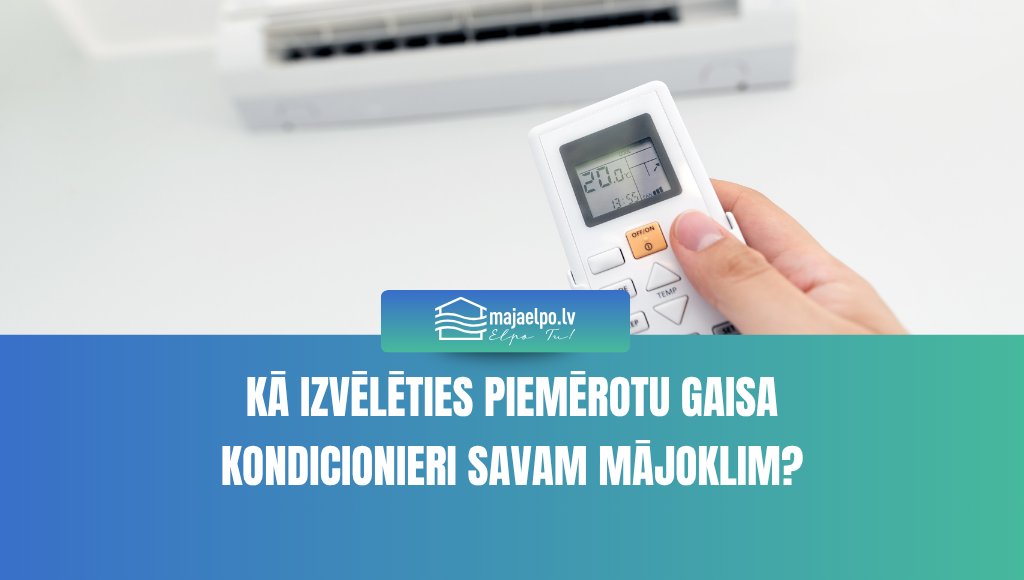
How to Choose the Right Air Conditioner for Your Home?
|
|
In today's changing weather conditions, we are increasingly encountering hot summers, which makes air conditioning an indispensable device in the home. It not only provides a comfortable temperature but also improves air quality and promotes a healthy indoor environment.
However, with such a wide range of air conditioners available on the market, a logical question arises—how to choose the most suitable solution? To purchase the right equipment, several factors must be evaluated: room size, installation options, energy efficiency, and additional features. This article will cover all the essential aspects that will help you make the right decision and ensure comfort in your home both in summer and throughout the rest of the year.
The first step in choosing is to determine the most suitable type of air conditioner. Today, four main types are available, each suitable for different needs and life situations.
1.1. Air Conditioners with Outdoor Unit (Split System) These are the most commonly chosen air conditioners for both residential buildings and offices. They consist of two parts – an indoor unit, which is installed inside the rooms, and an outdoor unit, which is placed outside the building.
Advantages:
High cooling and heating capacity
Quiet operation (the noisier part is outside)
Diverse design – wall, floor, or ceiling mounting
Excellent for both cooling and heating (in heat pump mode)
Disadvantages:
Requires professional installation
Requires access to the outside of the building (can be difficult in apartments or urban areas)
Suitable for:
Private houses, townhouses
Offices or premises with a constant need for microclimate regulation
1.2. Air Conditioners Without Outdoor Unit An ideal solution for historical buildings, apartments with facade restrictions, or places where an outdoor unit cannot be installed.
Advantages:
Easy and quick installation (no need to build communications between two units)
No facade damage required
Compact and modern design
Disadvantages:
Lower cooling capacity than split systems
Limited airflow and efficiency in larger rooms
Suitable for:
City apartments
Rooms where outdoor unit installation is prohibited
1.3. Mobile (Portable) Air Conditioners These units do not require fixed installation and can be freely moved from one room to another.
Advantages:
No installation work required
A good choice for rental properties or temporary use
Some models also offer air dehumidification
Disadvantages:
Higher noise level
Hot air must be vented through a window or wall
Limited efficiency in large rooms
Suitable for:
Tenants who cannot make permanent changes
Rooms with a temporary need for cooling (e.g., events or construction sites)
1.4. Air Coolers (Evaporative Coolers) These units operate on the principle of water evaporation and do not require a condenser or freon.
Advantages:
Environmentally friendly (no chemicals)
Low electricity consumption
Simple to move and use
Disadvantages:
Efficiency depends on humidity – works best in dry climates
Not suitable for long-term and precise temperature control
Suitable for:
Seasonal cooling
Terraces, loggias, temporary workshops
One of the most important aspects is choosing the appropriate capacity. If the air conditioner is too weak – it will not be able to provide comfort. If it's too powerful – it will waste unnecessary energy and incur unnecessary costs.
Basic Formula: Approximately 100 W per m² of room space. Thus, a 20 m² room will suffice with ~2 kW of power.
However, this calculation is influenced by several other factors:
Number and placement of windows: Rooms on the south side heat up more.
Ceiling height: Higher ceilings require greater cooling capacity.
Thermal insulation: In poorly insulated homes, the air conditioner will have to work harder.
Additional heat sources: Electronics, number of people in the room, solar radiation.
Open-plan rooms: Require a more powerful unit or multiple units.
Tip: If you are unsure, it is best to consult a professional installer who will perform an accurate power calculation and select the most suitable model.
OR
Modern air conditioners are becoming smarter and more versatile. Consider what additional features can improve your daily convenience and reduce long-term costs.
Heat Pump Function Most modern air conditioners also function as heat pumps, providing heating in spring and autumn. This allows you to reduce dependence on the central heating system.
Inverter Technology An inverter compressor adjusts the operating speed according to the room temperature, making the device more energy-efficient, quieter, and longer-lasting.
Air Dehumidification An especially important function in humid climates or rooms with poor ventilation. Reduces the risks of mold and dampness.
Air Filtration Many air conditioners are equipped with HEPA or activated carbon filters that purify the air from dust, pollen, and odors—essential for allergy sufferers.
Wi-Fi Control The ability to control the air conditioner remotely using an application. Very convenient if you want to cool your home in advance before returning.
No air conditioner can be considered "ideal" without proper installation and regular maintenance. An incorrectly installed unit can lose up to 30% of its efficiency.
Recommendations:
Installation should be performed by a certified specialist.
Filters should be cleaned regularly (every 2–4 weeks).
A full service (outdoor/indoor unit, gas level, etc.) is recommended at least once a year.
When choosing a suitable air conditioner, it is necessary to consider not only the price-to-power ratio but also the room's specifics, installation options, and daily comfort. To achieve maximum efficiency and long-term benefits, we recommend:
✅ Evaluate the room size, window placement, and ceiling height.
✅ Determine whether outdoor unit installation is possible.
✅ Consider long-term costs, not just the initial price.
✅ Carefully choose a reliable manufacturer and a professional installer.
Are you unsure which model to choose? Our team will be happy to help you select the most suitable air conditioner for your home—from consultation to installation. Contact us today!
OR


